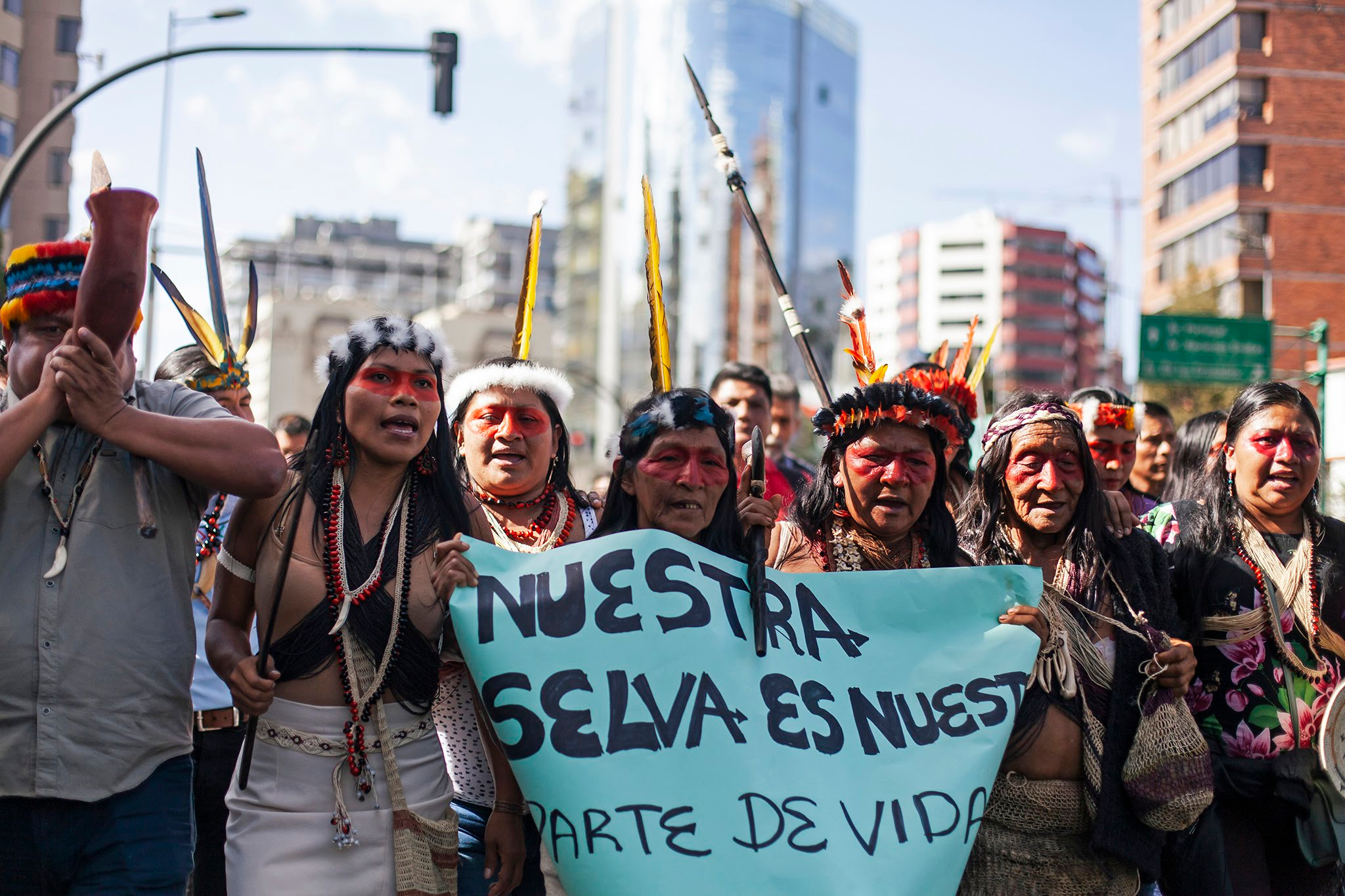Combating corruption to address the triple planetary crisis
December 12, 2023

Indigenous peoples from Alianza Ceibo fight to counter environmental degradation and protect more than two million hectares of primary rainforest in four provinces and 70 communities in the Ecuadorian Amazon.
The triple planetary crisis of climate crisis, biodiversity loss, and pollution is a threat to the well-being and survival of millions of people around the world. Corruption in its many forms, worsens these multiple crises.
From illegal logging and wildlife trafficking to bribery in environmental permits, to lax enforcement of regulations, corruption inflicts severe damage on our already fragile ecosystems.
In the forestry sector alone, close to 420 million hectares of forest have been lost between 1990 and 2020 as a result of deforestation enabled by corruption.
Climate change interventions are worth US$546 billion and, although difficult to measure accurately, Transparency International estimates suggest anywhere between 1.4 and 35 percent of climate action funds have been lost to corruption, and in 2021 alone, over 350 land and environmental defenders were murdered.
UNDP has been recognizing and championing Indigenous forest defenders like Nemonte Nenquimo, the Indigenous Waorani activist from Ecuador, co-founder of the Alianza Ceibo, UNDP Equator Prize winner of 2014, and who was named among the 100 most influential people of 2020 by the Time Magazine. There are 275 Equator Prize winners many of whom are defending land rights.
Anti-corruption is a development financing issue.
Corruption siphons off funds from urgently needed climate financing and the green energy transition. Effective, transparent, and inclusive governance mechanisms and institutions are prerequisites for combating corruption and will help not only ensure that financing achieves its maximum impact, but also contributes to the trust required for the releasing of additional funds.
If we can tackle corruption, we can improve efforts to successfully protect our environment. However, we must act now and we must work together. Anti-corruption tools, including those powered by digital advancements, have the potential to help countries reach their climate goals.
Resources lost in illicit financial flows and to corruption each year can be used in targeted investments in governance, social protection, the green economy, and digitalization. This is the ‘Sustainable Development Goal (SDG) Push’ scenario which would prevent as many as 169 million people from being driven into extreme poverty by 2030.
Governance mechanisms must be in place
UNDP is working to promote the investment of over $1 trillion of public expenditure and private capital in the SDGs. A portion of these investments are likely to be directed towards climate finance.
In Sri Lanka and Uganda, UNDP is using data and digital monitoring tools to tackle illegal environmental practices and promote integrity and transparency in environmental resource management.
UNDP has also recently launched its Energy Governance Framework for a Just Energy Transition to contribute to more inclusive and accountable energy transitions. In Eswatini, UNDP is supporting inclusive national dialogues to identify mini-grid delivery models and to clarify priority interventions for an inclusive and integrated approach to off-grid electrification. A mini-grid delivery model, determined by the national government with active multi-stakeholder engagement, is the cornerstone of a country’s over-arching mini-grid regulatory framework. It defines who finances, builds, owns, operates and maintains the mini-grids.
Technology must be promoted
To ensure that crucial financial resources are not manipulated by corruption, we must ensure that transparency mechanisms exist. With appropriate safeguards in place, technology can be a game-changer for addressing corruption. Big data analytics, mobile applications and e-governance systems are valuable tools in the prevention, detection and investigation of corruption.
In Ukraine, a new e-platform supported by UNDP is increasing transparency in procurement. UNDP in partnership with the EU and the National Agency on Corruption Prevention has also developed a new basic online course to train anti-corruption officers.
Partnerships against corruption must galvanize global efforts
UNDP and the Oversight and Anti-Corruption Authority of the Kingdom of Saudi Arabia (Nazaha) are jointly launching a new global initiative for measuring corruption at the 10th Session of the Conference of the States Parties to UN Convention Against Corruption (UNCAC), hosted by the United States in Atlanta from 11 – 15 December 2023.
The objective of this new partnership is to strengthen international cooperation to fight corruption and enable countries to track and monitor progress on tackling corruption. This new initiative will develop indicators to evaluate progress and efforts of countries to end multiple forms of corruption. It will identify policy recommendations and reforms to enable countries to achieve national anti-corruption objectives, as well as address the SDG 16 targets for reducing corruption and illicit financial flows.
UNDP remains committed to being united against corruption and to advance the spirit and the letter of the United Nations Convention Against Corruption by driving new efforts to measure corruption with our partners from the UN and beyond.
This article was originally published here.

 Locations
Locations